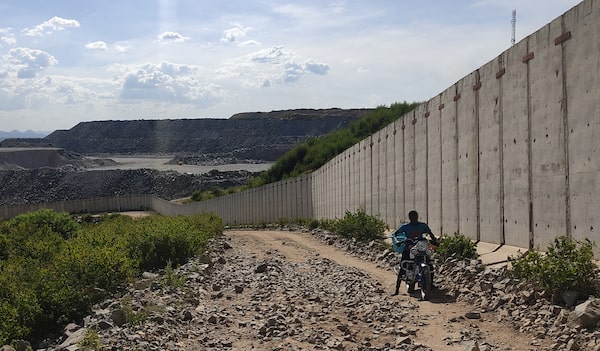
The British law firm Leigh Day, representing the Tanzanian claimants, says the Barrick Gold mine at North Mara is one of the deadliest in Africa.Supplied
London’s bullion market association is abandoning a jurisdictional challenge to a lawsuit by Tanzanian claimants, setting the stage for a British trial into allegations that the association is wrongly giving human-rights clearance to gold products from Barrick Gold Corp.’s controversial North Mara mine.
The lawsuit was filed in London in 2022 by relatives of two Tanzanian men allegedly killed by security forces at the North Mara gold mine, but the jurisdictional argument had delayed the trial for nearly a year.
The London Bullion Market Association (LBMA), which oversees the world’s largest gold market with an estimated US$230-billion in weekly trading, has certified Barrick’s ABX-T gold from North Mara as “responsibly sourced.”
Last August, the LBMA submitted arguments to the London court that the lawsuit should be heard in Tanzania. But on Monday, just days before a scheduled hearing into the issue, it disclosed that it had dropped the bid.
“We can confirm that LBMA are no longer proceeding with the jurisdictional challenge,” said Katherine Ernst, a spokesperson for the association.
“LBMA will be defending the substance of the claim when we proceed to trial,” she told The Globe and Mail in a written response to questions.
The LBMA’s accreditation system is aimed at raising human-rights standards in the gold supply chain by requiring refiners to comply with responsible sourcing guidelines and by obtaining independent third-party verification of their compliance, Ms. Ernst said.
The British law firm Leigh Day, representing the Tanzanian claimants, said the Barrick mine at North Mara is one of the deadliest in Africa. At least 77 deaths and 304 injuries by police and security guards were reported between 2006 and 2023, and further deaths were reported this year, it said.
It said the jurisdictional argument was a delaying tactic, since victims of human-rights abuses would have “extreme difficulty” in getting justice in Tanzanian courts.
The law firm said it expects the case to go to trial in London’s High Court next year. The case will test for the first time whether a certification body can be held legally responsible for flaws in the certification process that provide cover to human-rights abuses, it said.
Ian McGugan: As gold surges, should investors bet on a rally they don’t understand?
The power of gold: For many South Asian women, it’s much more than jewellery
“Our clients are pleased that they will get their day in court to seek justice for the deaths of their relatives,” Alex Wessely, one of the lawyers leading the case, said in a statement on Monday.
“It is a shame that the LBMA has wasted almost 10 months pursuing this [jurisdiction] application, only to drop it at the 11th hour, but I am very pleased that the litigation is now back on track,” he said.
Barrick is not a formal party to the lawsuit against the LBMA. The company did not respond to questions from The Globe and Mail about the case on Monday.
Anneke Van Woudenberg, executive director of a British-based corporate watchdog, Rights and Accountability in Development (RAID), said the LBMA’s decision to drop the jurisdiction challenge is “a significant first win for bereaved Tanzanian families.” She said the LBMA has failed to act effectively on repeated complaints about human-rights violations at North Mara.
Human Rights Watch, an independent U.S.-based group, said last week that the police guarding the North Mara mine have been linked to the killing of at least six people since February this year. It urged the Tanzanian authorities to launch impartial investigations into the killings, describing it as “a worrying pattern of impunity for abuses.”
In a letter of response, Barrick chief executive officer Mark Bristow said the company does not control or supervise the police at North Mara. He drew a distinction between Barrick and its North Mara subsidiary, which is 84 per cent owned by Barrick, and he said the subsidiary does not directly pay the police.
In March, Barrick announced that its subsidiaries had settled an earlier British court case with 10 Tanzanian villagers who alleged that police and security guards had caused deaths and injuries near the North Mara mine. The two subsidiaries did not admit any liability.
In 2015, another Barrick subsidiary settled a case with 12 Tanzanians over similar allegations of deaths and injuries by police and security at the same mine.
In another related case, two law firms filed suit against Barrick in Ontario Superior Court in 2022 on behalf of 21 Tanzanians who alleged that they or their family members were killed, injured or tortured by police guarding the North Mara mine.